|
Books Should Be Free Loyal Books Free Public Domain Audiobooks & eBook Downloads |
|
|
Books Should Be Free Loyal Books Free Public Domain Audiobooks & eBook Downloads |
|
Top Authors |
|---|
|
Book type:
Sort by:
|
By: Edwin F. Benson | |
|---|---|
 Life in a Mediaeval City, Illustrated by York in the XVth Century
Life in a Mediaeval City, Illustrated by York in the XVth Century
A short and gentle overview of mediaeval life in a large city. It lightly covers the class structure of society, local government, guilds, pageantry and punishment. The author has an easy, rhythmic style which leaves the reader wanting to find out more. | |
By: Carley Dawson (1910-1977) | |
|---|---|
 Mr Wicker's Window
Mr Wicker's Window
When Christopher Mason walked into Mr. Wicker's antique shop, he had no idea he would soon be embarking on a marvellous journey to China to find a wonderful tree made of jewels. He had no idea that Mr. Wicker was a magician and could travel through time. And that the tree was sought by others, not least among them the murderous Claggett Chew, a merchant in port and a pirate on the high seas, who also had knowledge of magic. But before Chris succeeded in quest, he would know of all these things and more... | |
By: E. R. Eddison | |
|---|---|
 The Worm Ouroboros
The Worm Ouroboros
This classic 1922 fantasy novel brings you to a strange and lovely world where a young lord wrestles King Gorice for his land’s freedom, where unscalable mountains can only be conquered by stubbornness and hippogriffs, where the great explorer Lord Gro finds himself continually driven to betrayal, where sweet young women occasionally fall for evil wizards, and where the heroes actually win their hearts’ desire. | |
By: Rebecca West (1892-1983) | |
|---|---|
 The Return of the Soldier
The Return of the Soldier
In 1916 on an isolated country estate just outside London, Captain Chris Baldry, a shell-shocked captain suffering from amnesia, makes a bittersweet homecoming to the three women who have helped shape his life. Will the devoted wife he can no longer recollect, the favorite cousin he remembers only as a childhood friend, and the poor innkeeper’s daughter he once courted leave Chris to languish in a safe, dreamy past–or will they help him recover his memory so that he can return to the front? The answer is revealed through a heart-wrenching, unexpected sacrifice. | |
 The Judge
The Judge
| |
By: E.D.E.N. Southworth. | |
|---|---|
 The Hidden Hand
The Hidden Hand
“If you will listen to this book, you will meet a cast of unforgettable characters, as different from one another as the sun and moon. But they have one thing in common – all of them hide many, many secrets. The plot of this book is full of twists which may leave you guessing until the end. Bridget’s lively reading adds much to the joy of listening to this book.” (Summary by Stav Nisser) | |
By: Joris-Karl Huysmans | |
|---|---|
 Against the Grain, or Against Nature
Against the Grain, or Against Nature
“THE BOOK THAT DORIAN GRAY LOVED AND THAT INSPIRED OSCAR WILDE”. Such is the enticing epigraph of one early translation of Huysmans’ cult novel of 1884, which is also routinely called the Bible of Decadence. Accurate descriptions, both, of this bizarre masterpiece which has reverberated ever since through high and popular culture. “Against Nature” (or in this version “Against The Grain”) explores to the furthest limit the life of the world-rejecting aesthete living a reclusive existence devoted entirely to artificial paradises of his own devising... | |
By: Charles Foster Kent | |
|---|---|
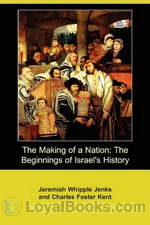 The Making of a Nation: The Beginnings of Israel's History
The Making of a Nation: The Beginnings of Israel's History
Charles Foster Kent was one of the premier scholars in Jewish Studies at the turn of the century. He was particularly well-known for his comparisons of early Christianity to its Jewish roots. He also wrote several distinguished histories of Israel, the Jewish people, Torah studies, and the development of oral Torah. | |
 The Makers and Teachers of Judaism
The Makers and Teachers of Judaism
| |
 The Origin and Permanent Value of the Old Testament
The Origin and Permanent Value of the Old Testament
| |
By: Albert Payson Terhune (1872-1942) | |
|---|---|
 His Dog
His Dog
Albert Payson Terhune, perhaps best known for his book Lad, a Dog (later turned into a popular movie), was also a breeder of collies and a journalist. Some of his collie lines survive to this day. His Dog is a story about Link Ferris who finds an injured dog on his way home one evening. Knowing nothing about dogs, Link nurses the dog back to health and the two form a bond such as only can be formed between human and canine. Unable to locate the collie’s owner, Link christens his dog ‘Chum’ who becomes invaluable in tending to the daily needs of his meager farm... | |
 Further Adventures of Lad
Further Adventures of Lad
| |
By: Albert Payson Terhune (1872-1942) | |
|---|---|
 Bruce
Bruce
Albert Payson Terhune was a journalist but is probably best known as a breeder of dogs, in particular collies at his Sunnybank Kennels. Bruce charts the story of an unwanted puppy who becomes loved by the mistress of the family. He then becomes enlisted as a carrier dog in World War 1, completing heroic tasks and coming home a war hero | |
By: Albert Payson Terhune (1872-1942) | |
|---|---|
 Black Caesar's Clan : a Florida Mystery Story
Black Caesar's Clan : a Florida Mystery Story
| |
By: Rose Wilder Lane (1886-1968) | |
|---|---|
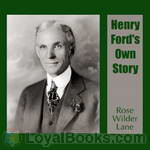 Henry Ford's Own Story
Henry Ford's Own Story
Rose Wilder Lane was a newspaper reporter, free-lance writer, political activist, and the daughter of Laura Ingalls Wilder, author of the "Little House" series of popular children's books. In this biography of Henry Ford, Ms. Lane worked directly with Ford to tell his story from his birth to his founding of the Ford Motor Company and his use of modern assembly lines to mass produce his cars. | |
By: William F. Cody | |
|---|---|
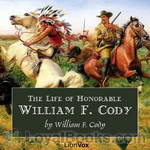 The Life of Honorable William F. Cody
The Life of Honorable William F. Cody
The life and adventures of Honorable William F. Cody–Buffalo Bill–as told by himself, make up a narrative which reads more like romance than reality, and which in many respects will prove a valuable contribution to the records of our Western frontier history. While no literary excellence is claimed for the narrative, it has the greater merit of being truthful, and is verified in such a manner that no one can doubt its veracity. The frequent reference to such military men as Generals Sheridan, Carr, Merritt, Crook, Terry, Colonel Royal, and other officers under whom Mr... | |
By: Stamp Act Congress of 1765 | |
|---|---|
 Declaration of Rights
Declaration of Rights
On June 8, 1765 James Otis, supported by the Massachusetts Assembly sent a letter to each colony calling for a general meeting of delegates. The meeting was to be held in New York City in October. Representatives from nine colonies met in New York. Though New Hampshire, Virginia, North Carolina and Georgia did not send delegates, the Assemblies of those missing colonies nonetheless agreed to support the works of the Congress. The meetings were held in Federal Hall in New York, and the delegates assembled on October 2... | |
By: Lilian Gask | |
|---|---|
 Folk Tales from Many Lands
Folk Tales from Many Lands
A collection of poetic folk tales from all over the world. (Kalynda) | |
By: Marianne Moore (1887-1972) | |
|---|---|
 Poems
Poems
In 1921, American poet H.D. collected and published a selection of previously published poems by Marianne Moore. Although this angered Moore, as it was entirely unauthorized, she later accepted the edition as well made and used it as the basis for her own 1924 publication of Obersvations. Moore’s unique poetry matches the experimentation underway during the American Modernist movement. Much of it incorporates seemingly out-of-place quotations into complex free verse that often uses Nature as a subject matter... | |
By: Mack Reynolds (1917-1983) | |
|---|---|
 Mercenary
Mercenary
Every status-quo-caste society in history has left open two roads to rise above your caste: The Priest and The Warrior. But in a society of TV and tranquilizers--the Warrior acquires a strange new meaning... (Introduction from the Gutenberg text) | |
 Ultima Thule
Ultima Thule
Ronny Bronston has dreamed all his life of getting a United Planets job that would take him off-world. He finally gets the opportunity when he is given a provisional assignment with Bureau of Investigation, Section G. But will he be able to complete his assignment and find the elusive Tommy Paine? | |
 Happy Ending
Happy Ending
| |
 I'm a Stranger Here Myself
I'm a Stranger Here Myself
| |
 Gun for Hire
Gun for Hire
| |
 Dogfight—1973
Dogfight—1973
| |
 Combat
Combat
| |
By: Dallas McCord Reynolds (1917-1983) | |
|---|---|
 Status Quo
Status Quo
Larry Woolford is a government agent, tasked with investigating subversive activity. He does everything an ambitious young man should do if he wants to succeed: wear the right clothes, listen to the right music, even drink vodka martinis. Then he stumbles across a conspiracy of Weirds plotting to overthow the entire existing social order. It's a race against time. Can he stop their fiendish plan, and keep America safe for shallow judgements based on status symbols? Status Quo was nominated for the 1962 Hugo Award for short fiction. | |
By: Mack Reynolds (1917-1983) | |
|---|---|
 The Common Man
The Common Man
| |
 Freedom
Freedom
| |
 Border, Breed Nor Birth
Border, Breed Nor Birth
| |
 Medal of Honor
Medal of Honor
| |
 Unborn Tomorrow
Unborn Tomorrow
| |
 Subversive
Subversive
| |
 Black Man's Burden
Black Man's Burden
| |
 Off Course
Off Course
| |
 Summit
Summit
| |
 Expediter
Expediter
| |
By: LibriVox volunteers | |
|---|---|
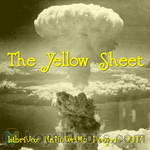 The Yellow Sheet – the NaNoWriMo project 2007
The Yellow Sheet – the NaNoWriMo project 2007
An atomic bomb explodes in the mountains of Montana. But was there really a bomb? And was it really in Montana, or in Tokyo? Are Liz and Elizabeth the same woman, is she married with children, is her husband a spy? | |
By: Margaret Warner Morley (1858-1923) | |
|---|---|
 The Insect Folk
The Insect Folk
Through delightful outings with her students, a teacher introduces her class to the fascinating world of insects. She encourages her students to observe and ask questions. This is a wonderful science text for young children. | |
 The Renewal of Life; How and When to Tell the Story to the Young
The Renewal of Life; How and When to Tell the Story to the Young
| |
By: Cornelia Mee | |
|---|---|
 Exercises in Knitting
Exercises in Knitting
Mrs. Mee, her husband, and her sister ran a yarn and needlework import/warehouse business in Bath, England. Her books primarily contain practical everyday items that knit up quickly with the busy homemaker in mind. At this time, published knitting “receipts” did not contain abbreviations and were laborious to use. They were, however, rich in error! Later in her career, due to circumstances of war and the resulting social stress and poverty, many of her knitting books were printed for ladies’ charitable societies, which used her knitting “receipts” to clothe the poor mill workers who were out of work due to the American Civil War and the embargo of cotton. | |
By: Adelbert von Chamisso (1781-1838) | |
|---|---|
 Peter Schlemihl
Peter Schlemihl
| |
 Peter Schlemihl
Peter Schlemihl
| |
By: Gotthold Ephraim Lessing (1729-1781) | |
|---|---|
 Miss Sara Sampson
Miss Sara Sampson
G.E. Lessing, widely regarded by students of theater as the world's first dramaturg, was also one of the first proponents of the German bourgeois tragedy. Miss Sara Sampson, in which a young woman runs off with a ne'er-do-well who is still entangled with his former mistress, was a reaction against the Voltarian verse drama popular in the eighteenth century. | |
 Nathan the Wise; a dramatic poem in five acts
Nathan the Wise; a dramatic poem in five acts
| |
 Minna Von Barnhelm
Minna Von Barnhelm
| |
By: Benjamin L. (Benjamin Leonard) D'Ooge (1860-1940) | |
|---|---|
 Latin for Beginners
Latin for Beginners
| |
By: Hendrik Conscience (1812-1883) | |
|---|---|
 The Amulet
The Amulet
| |
 The Poor Gentleman
The Poor Gentleman
| |
By: Isabella L. Bird | |
|---|---|
 The Englishwoman in America
The Englishwoman in America
Isabella Bird travels abroad in Canada and the United States in the 1850s. As an Englishwoman and a lone female, she travels as far as Chicago, Prince Edward Island, and Cincinatti. Her observations on the trials and tribulations of the journeys are astute, if formed by her place and time in history. Adventures with pickpockets, omnibuses, cholera, and rat invested hotels deter her not. (Sibella Denton) | |
By: Lao Tzu | |
|---|---|
 Laotzu's Tao and Wu Wei
Laotzu's Tao and Wu Wei
The classic of the Way and of High Virtue is the Tao Teh Ching. Its author is generally held as a contemporary of Confucius, Lao Tzu, or Laozi. The exact date of the book’s origin is disputed. The book is divided into two parts, the Upper Part and the Lower Part. The Upper Part consists of chapters 1-37, and each chapter begins with the word “Tao,” or the Way. The Lower Part consists of chapters 38-81, and each chapter begins with the words “Shang Teh,” or High Virtue. This 1919 edition names the Lower Part as the Wu Wei, or translated variously as “not doing,” “non-ado,” or “non-assertion... | |
By: D. H. Lawrence (1885-1930) | |
|---|---|
 Fantasia of the Unconscious
Fantasia of the Unconscious
| |
 Aaron's Rod
Aaron's Rod
Flutist Aaron Sisson is caught up in the aftermath of WWI. A lost soul, he attempts to find himself in the comfort of bar-room talk and alcohol and a woman. Moving on, he spends time with a mining executive's relatives. But he finds the family a stuffy middle-class lot, bored with each other and themselves. He leaves his wife and children and strikes out for the open road. During a playing engagement at an opera performance, he reunites with the mining executive's family. Talk is of love and war, none of it very satisfying to anyone... | |
 Lost Girl
Lost Girl
"There is no mistake about it, Alvina was a lost girl. She was cut off from everything she belonged to." In this most under-valued of his novels, Lawrence once again presents us with a young woman hemmed in by her middle-class upbringing and (like Ursula Brangwen in The Rainbow) longing for escape. Alvina Houghton's plight, however, is given a rather comic and even picaresque treatment. Losing first her mother, a perpetual invalid, and later her cross-dressing father, a woefully ineffectual small-scale entrepreneur, Alvina feels doomed to merge with the tribe of eternal spinsters who surround her in the dreary mining community of Woodhouse... | |
 The Prussian Officer
The Prussian Officer
| |
 Look! We Have Come Through!
Look! We Have Come Through!
| |
 New Poems
New Poems
| |
 Bay A Book of Poems
Bay A Book of Poems
| |
 Wintry Peacock
Wintry Peacock
| |
By: George L. Apperson (1857-1937) | |
|---|---|
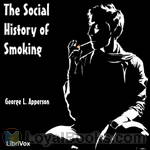 The Social History of Smoking
The Social History of Smoking
This work tells the history of smoking in England from the social point of view. Thus it does not deal with the history of tobacco growing or tobacco related manufacture, but is rather the story of how smoking has fitted in with the fashions and customs throughout the ages, and the changes in the attitude of society towards smoking. | |
By: Pu Songling (1640-1715) | |
|---|---|
 Strange Stories From a Chinese Studio
Strange Stories From a Chinese Studio
MANUAL OF SURGERY, OXFORD MEDICAL PUBLICATIONSBY ALEXIS THOMSON, F.R.C.S.Ed.PREFACE TO SIXTH EDITION Much has happened since this Manual was last revised, and many surgical lessons have been learned in the hard school of war. Some may yet have to be unlearned, and others have but little bearing on the problems presented to the civilian surgeon. Save in its broadest principles, the surgery of warfare is a thing apart from the general surgery of civil life, and the exhaustive literature now available on every aspect of it makes it unnecessary that it should receive detailed consideration in a manual for students... | |
By: Edward George Bulwer-Lytton (1803-1873) | |
|---|---|
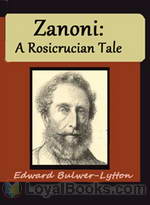 Zanoni
Zanoni
Zanoni, a timeless Rosicrucian brother, cannot fall in love without losing his power of immortality; but he does fall in love with Viola Pisani, a promising young opera singer from Naples, the daughter of Pisani, a misunderstood Italian violinist. An English gentleman named Glyndon loves Viola as well, but is indecisive about proposing marriage, and then renounces his love in order to pursue occult study. The story develops in the days of the French Revolution in 1789. Zanoni has lived since the Chaldean civilization... | |
 Athens: Its Rise and Fall
Athens: Its Rise and Fall
| |
 Harold : the Last of the Saxon Kings
Harold : the Last of the Saxon Kings
| |
 What Will He Do with It?
What Will He Do with It?
| |
 Rienzi, Last of the Roman Tribunes
Rienzi, Last of the Roman Tribunes
| |
 A Strange Story
A Strange Story
| |
 Alice, or the Mysteries
Alice, or the Mysteries
| |
 Eugene Aram
Eugene Aram
| |
 The Last of the Barons
The Last of the Barons
| |
 The Pilgrims of the Rhine
The Pilgrims of the Rhine
| |
 Ernest Maltravers
Ernest Maltravers
| |
 Pausanias, the Spartan The Haunted and the Haunters, an Unfinished Historical Romance
Pausanias, the Spartan The Haunted and the Haunters, an Unfinished Historical Romance
| |
 The Works Of Edward Bulwer-Lytton
The Works Of Edward Bulwer-Lytton
| |
 Kenelm Chillingly
Kenelm Chillingly
| |
 Leila or, the Siege of Granada
Leila or, the Siege of Granada
| |
 The Disowned
The Disowned
| |
 Devereux
Devereux
| |
 Lucretia
Lucretia
| |
 Night and Morning
Night and Morning
| |